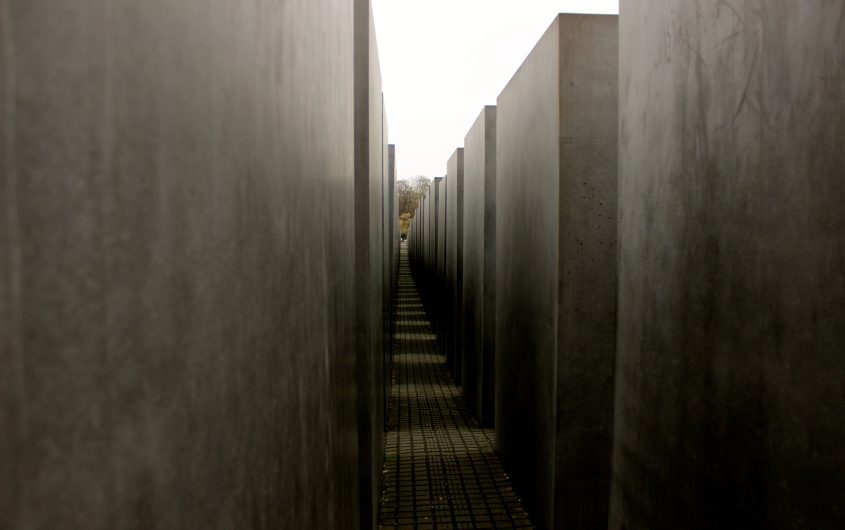
Daniel Huizinga via Flickr
Germany’s Changing Culture of Remembrance

Julian M. Hoerner
University of Birmingham
Julian M. Hoerner is Lecturer (Assistant Professor) in Politics in the Department of Politics and International Studies (POLSIS) at the University of Birmingham (UK). Before joining POLSIS in 2021, Julian was a Senior Research Analyst covering the European Union and Germany at the UK Foreign, Commonwealth and Development Office and a Fellow in European Politics and Public Policy at the London School of Economics and Political Science. He holds a PhD and an MSc in European Studies from the LSE and a BA from Maastricht University. In his current research, he focuses on the impact of the culture of remembrance on contemporary politics in Europe. He also has an interest in the politics and policies of the European Union. He is currently planning a project on how different framings of culture of remembrance with regard to the Holocaust impact political attitudes and behaviours in Germany and Austria, using both survey experiments and focus groups.
New Normative and Empirical Debates
Germany’s culture of remembrance of the Holocaust has received renewed attention in recent years. Only very few witnesses and survivors are still with us, and there is some evidence that knowledge about the Holocaust is declining in Europe, especially in the younger generation.
At the same time, the culture of remembrance has again become the subject of political and academic debate. Over the past years, scholars and journalists have debated whether and how colonial crimes of European nations should be remembered alongside the Holocaust, and to what extent Nazi atrocities can be related to different contexts. Far from being a rehash of the Historikerstreit of the 1980s, these debates are largely taking place among progressive historians and memory studies scholars, and center around whether the German culture of remembrance has become or is at risk of becoming too dogmatic and would benefit from more “multidirectionality.”
Germany’s culture of remembrance has also received renewed attention in a very different context. With the success of the far-right Alternative für Deutschland (AfD), for the first time in decades, a political party which at least in parts engages in relativization and challenges Germany’s culture of remembrance is now represented in the Bundestag. In 2017, a prominent politician of the party referred to the Holocaust memorial in Berlin as a “monument of shame.” Research by David Art on the far-right and memory politics showed almost two decades ago that different frames of remembering Nazi rule and the Holocaust shape differences in the success of far-right parties in Germany and Austria as the Nazi successor states, while recent work, for example by Jenny Wüstenberg, found that far-right actors have the potential to mobilize on grievances with Germany’s culture of remembrance.
More recently, the success of the far-right has also been an outcome of interest in the growing engagement of quantitative social science with the Holocaust and its contemporary political legacies, as Volha Charnysh explains in a post on the “Broadstreet” blog. A factor which has received particular attention is the impact of spatial proximity to former concentration camps on far-right voting today. The first of these studies—albeit focusing on Poland—was a seminal article by Charnysh and Finkel published in 2017, in which the authors analyze the impact of property transfers in the vicinity of the Treblinka extermination camp and find durable historical legacies in the proximity of the camp in terms of support for an antisemitic far-right party decades after the end of World War II. One potential mechanism they propose is “cognitive dissonance,” with those (indirectly) benefitting economically from living in proximity to the camps being receptive to messages from political actors berating the victims. Following this study, others have applied a similar research design to Germany, the country or the perpetrators. Focusing on several concentration camps within the border of contemporary Germany, Homola et al. (2020) find that there has been a higher vote share of the far-right in recent federal elections in areas of proximity to the former camps. They argue that Germans living closer to the sites were more likely to adopt the ideology of the Nazi regime (again due to cognitive dissonance) and that these attitudes and beliefs were handed down to the contemporaries’ descendants. However, another study by Pepinsky et al. (2022) did not find such an effect, leading to a debate around the challenge of modeling historical persistence using statistical methods. In my own work with Toni Rodon and Alexander Jaax, we find that the effect of living in proximity to a former concentration camp increases far-right voting in western Germany, but not in the eastern Länder. A tentative explanation is a “memory satiation effect,” potentially suggesting that people frequently exposed to some forms of commemoration of in-group atrocities might under certain conditions be more open to relativizing and normalizing accounts of their country’s past and statements challenging the established culture of remembrance by far-right actors. In West Germany, official commemoration policies were more strongly focused on the Holocaust (at least from the 1970s onwards) than in the former GDR.
The culture of remembrance with regard to the Holocaust is at a crucial point in Germany and beyond, as we are facing a reality of commemoration without survivors and potentially declining public knowledge and overall awareness.
However, direct empirical and in particular quantitative evidence regarding the impact of commemorative policies and practices on citizens’ attitudes and voting behavior remains scarce. A recent working paper by Anselm Hager and Miguel Pereira shows that Stolpersteine (small memorial plaques commemorating victims of the Holocaust in proximity to their former residences) in Berlin precincts have a negative effect on the vote share of far-right parties in these areas. Using an experimental design on Holocaust remembrance in the Polish context, Volha Charnysh finds that while narratives around ingroup transgression reduce ethnocentric attitudes, combining these with an emphasis on the ingroup’s own victimhood decreases this effect and has a negative impact on support for minority rights.
In a recent pilot study for a planned larger project on the culture of remembrance in Germany and Austria, Toni Rodon and I find tentative evidence for the importance of survivor testimonies and politicians’ framings for the impact of different narratives of Holocaust memory and culture of remembrance. The preliminary findings of our online survey experiments with 1,600 participants based in Germany carried out in December 2022 suggest that respondents who were exposed to a short excerpt from a testimony speech by a Holocaust survivor on their experience and suffering might be somewhat more likely to state that the continued remembrance of the Holocaust is important. This effect appears to be strengthened when the survivor’s testimony is followed by an excerpt from a speech by a politician emphasizing the continued German responsibility to remember. However, the effect disappears when the survivor’s testimony is followed by a statement by a far-right politician arguing for a “normalization” of the German culture of remembrance with less emphasis on negative aspects of German history. Further steps will be to broaden the analysis to be able to differentiate between different societal contexts and legacies of official commemorative practices (e.g., in western Germany, eastern Germany/the former GDR, and Austria). The project will also explore the empirical impact of exposure to narratives on multiple ingroup atrocities (e.g., the Holocaust and colonial crimes), speaking to debates around “multidirectional memory.”
Overall, the culture of remembrance with regard to the Holocaust is at a crucial point in Germany and beyond, as we are facing a reality of commemoration without survivors and potentially declining public knowledge and overall awareness. Public and academic debates are increasingly focusing on the possibility of remembering different wrongs of the past together. At the same time, the relativization of continued responsibility by the far-right continues to pose an—arguably growing—challenge to the culture of remembrance in Germany and elsewhere. Together with history and memory studies, the social sciences are clearly well-placed to contribute to these debates, as was argued in a recent edited volume by Jeffrey Kopstein, Jelena Subotić, and Susan Welch. Moreover, empirical insights on the legacies of the past and their interaction with different narratives and official commemorative policies and practices could aid professionals working in (civic) education, museums, and memorial sites in developing effective educational materials and approaches for increasingly diverse and complex societies to prepare for an age without witnesses and survivors and to counter any attempts of relativization by the far-right.








